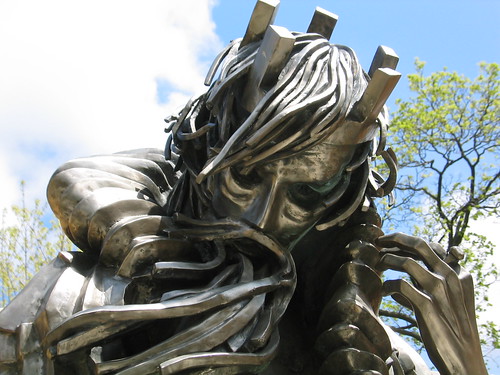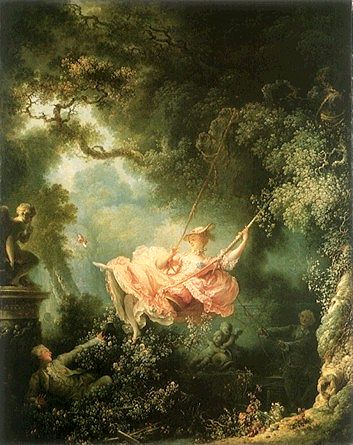In the comment box below post a passage of indirect characterization from the play that you read on your own.
Remember that indirect characterization is a tool writers use to imply something about a character without directly stating it. Writers may do this through the character's own actions, speech, and thoughts, as well as through what other characters think and say about the character. What a character looks like and how a character affects others can also contribute to indirect characterization.
The passages you pick should reveal aspects of a character (or characters) without directly stating what those aspects are. Therefore, a perceptive and thoughtful reader should be able to figure out what the author is suggesting without being directly told.
Thursday, February 28, 2008
Subscribe to:
Post Comments (Atom)








17 comments:
Excerpt from "Long Day's Journey Into Night (Act I) In this excerpt, the character of Mary Tyrone (a woman of about 54)is discussing her stance on doctors to her husband, James, and sons, Jamie and Edmund. Her son has a "summer cold" that has been bothering him and James has said he must visit a doctor.
MARY:
(A look of contemptuous hostility flashes across her face)
Doctor Hardy! I wouldn't believe a thing he said, if he swore on a stack of Bibles! I know what doctors are. They're all alike. Anything, they don't care what, to keep you coming to them.
(She stops short, overcome by a fit of acute self-consciousness as she catches their eyes fixed on her. Her hands jerk nervously to her hair. She forces a smile.)
What is it? What are you looking at? Is my hair--"
Death of a Salesman (Act one)
Biff and Happy are Willy's sons.
BIFF:Why does Dad mock me all the time?
HAPPY: He's not mocking you, he--
BIFF: Everything I say there's a twist of mockery on his face. I can't get near him.
HAPPY: He just wants you to make good, that's all. I wanted to talk to you about Dad for a long time, Biff. Something's--happening to him. He--talks to himself.
BIFF: I noticed that this morning. But he always mumbled.
HAPPY: But not so noticeable. It got so embarassing I sent him to Florida. And you know something? Most of the time he's talking to you.
BIFF: What's he say about me?
HAPPY: I can't make it out.
BIFF: What's he say about me?
HAPPY: I think the fact that you're not settled, that you're kind of up in the air...
BIFF: There's one or two other things depressing him, Happy.
HAPPY: What do you mean?
BIFF: Never mind. Just don't lay it all on me.
This is from "A Doll's House" by Henrik Ibsen. Nora is Helmer's wife.
Nora: Yes, I am very tired I could fall asleep.
Helmer:There your are-- there you are!!You see how right I was not to let you stay any longer.
Nora: You are always right, Torvald, whatever you do.
Ben Tavares
An Enemy of the People
This is the first scene in Act 1. When Peter Stockmann says "they" he is referring to the men in Dr. Stockmann's other room who are of the peasant class.
Dr, Stockmann. Yes, sit down and we will have it comfortably.
Peter Stockmann. Thanks, I never care about an evening's
drinking.
Dr. Stockmann. But this isn't an evening's drinking.
Peter Stockmann. It seems to me--. (Looks towards the dining-
room.) It is extraordinary how they can put away all that food.
Dr. Stockmann (rubbing his hands). Yes, isn't it splendid to see
young people eat? They have always got an appetite, you know!
That's as it should be. Lots of food--to build up their strength!
They are the people who are going to stir up the fermenting
forces of the future, Peter.
Peter Stockmann. May I ask what they will find here to "stir up,"
as you put it?
Dr. Stockmann. Ah, you must ask the young people that--when the
times comes. We shan't be able to see it, of course. That stands
to reason--two old fogies, like us.
Peter Stockmann. Really, really! I must say that is an extremely
odd expression to--
Dr. Stockmann. Oh, you mustn't take me too literally, Peter. I am
so heartily happy and contented, you know. I think it is such an
extraordinary piece of good fortune to be in the middle of all
this growing, germinating life. It is a splendid time to live in!
It is as if a whole new world were being created around one.
Peter Stockmann. Do you really think so?
From "An Enemy of the People" Act I. Ejlif is Mrs. Stockmann son, Hovstad and Morten are editors of a local newspaper, they are visting the Stockmanns. Mrs. Stockmann's daughter Petra has just walked in and is discussing how hard she works as a school teacher. Billing is a ships captain.
Hovstead: Don't you want to world as hard as that Morten?
Morten: No indeed I don't.
Hovstead: I should like best to be a Viking.
Ejlif: You would have to be a pagan then.
Morten: Well, I could become a pagan, couldn't I?
Billling: I agree with you, Morten! My sentiments, exactly.
Mrs. Stockmann (signalling to him). I am sure that is not true, Mr. Billing
Billing: Yes, I swear it is! I am a pagan, and I am proud of it. Believe me, before long we shall all be pagans.
Morten: And then shall we be allowed to do anything we like?
Billing: Well, you see Morten-.
Mrs. Stockman: You must go to your room, now boys; I am sure you have some lessons to learn for to-morrow.
Ejlif: I should like so much to say a little longer-
Mrs. Stockmann: No, no; away you go, both of you.
From "A Doll's House" by Henrik Ibsen doing
Helmer: You loved me as a wife should love her husband. It was just that you hadn't the experience to realize what you were doing. But do you imagine that you're any less dear to me for not knowing how to act on your own? No, no, you must simply rely on me - I shall advise you and guide you. I shouldn't be a proper man if your feminine helplessness didn't make you twice as attractive to me. You must forget all the hard things that I said to you in that first dreaful moment when it seemed as if the whole world was falling about my ears. I've forgiven you, Nora, I swear it - I've forgiven you.
Nora: Thank you for your forgiveness.
Blood Wedding
Act I Scene I
A mother is talking with her son about his upcoming marriage. The mother's husband and other son are both dead.
Mother: More than foolish. I'll be left alone. I only have you left, and I'm sad you are leaving.
Bridegroom: But you'll come with us.
Mother: No. I can't leave your father and brother here alone... I must go and see them every morning, and if I went away, likely one of the Felix's would die, one of that family of killers, and they'd bury him beside him. And it must not be! That! It must not be! Because I'd dig them up with my nails and shatter them against the wall myself.
Bridegroom: (Emphatically) Talk about something else.
Mother: Forgive me. (Pause) How long have you known her?
Bridegroom: Three years. I can buy the vineyard now.
Mother: Three years. She had a fiance, no?
Bridegroom: I don't know. I think not. A girl needs to take a good look at the man she marries.
Mother: Yes? I looked at no one. I looked at your father, and when they killed him I looked at the wall in front of me. One woman for one man, and that's it!
A Doll’s House
Nora, Torvald’s wife, has just finished telling her visiting friend Mrs. Linde about how she borrowed money from a bank by forging her father’s signature. She took this money and traveled to Italy in order to save her sick husband’s life. Torvald knows nothing of this and assumes Nora’s father legitimately signed the loan.
MRS LINDE: Aren’t you ever going to tell him?
NORA [Thoughtfully, with a smile]: Well-one day, perhaps. But not for a long time. When I’m not pretty any more. No, you mustn’t laugh. What I mean, of course, is when Torvald isn’t as fond of me as he is now – when my dancing and dressing up and reciting don’t amuse him any longer. It might be a good thing, then, to have something up my sleeve… [breaking off]. But that’s nonsense – that time’ll never come. Well, Kristina, what do you think of my great secret? Am I still of no use? What’s more, you can take my word for it that tit’s all been a great worry to me – it hasn’t been at all easy to meet all my obligations punctually. In business, you know, there are things called ‘quarterly payments’ and ‘installments’, and they’re always dreadfully hard to meet, so you see, I’ve had to scrape together a little bit here and a little bit there, whenever I could. I couldn’t save much out of the housekeeping money, because Torvald has to live properly, and I couldn’t have the children looking shabby. I didn’t feel I could touch the money that I had for my little darlings.
MRS LINDE: So it all had to come out of your own pocket-money? Poor Nora.
NORA: Of course. After all, it was my own doing. So whenever Torvald gave me money for new dresses and things, I never spent more than half of it – I always bought the simplest, cheapest things. Thank goodness anything looks well on me, so Torvald never noticed. But, oh Kristina, it hasn’t been at all easy, because it’s so nice to be beautifully dressed, isn’t it?
MRS LINDE: It certainly is.
After discovering her husband has left her for another woman, Medea, speaks to the women of Corinth explaining the troubles of a wife.
Medea: Surely, of all creatures that have life and will, we women are the most wretched. When, for an extravagant sum, we have bought a husband, we must then accept him as Possessor of our body. This is to aggravate wrong with worse wrong. Then the question; will the man we get be bad or good? For women, divorce is not respectable; to repel the man, not possible.
From "A Doll's House" Nora is talking about her dress that she is wearing to the dance she is attending with Torvald her husband. Mrs. Linde a family friend is fixing it.
Mrs.Linde: I see; you are going to keep up the character.
Nora: Yes, Torvald wants me to.Look, here is the dress; Torvald had it made for me there, but now it is all so torn, and I haven't any idea-
Mrs.Linde:We will easily put that right. It is only some of the trimming come unsewn here and there. Needle and thread? Now then, thats' all we want.
Juno and the Paycock
Act 2
In this excerpt, Boyle and Mary are seen discussing the new gramophone that is in their home.
MARY: I don't know what you wanted a gramophone for- I know Charlie hates them; he says they're destructive of real music
BOYLE: Destructive of music- that fella ud give a pain in your face. All a gramophone wants is to be properly played; its true wondher is only felt when everythin's quiet- what a gramophone wants is dead silence.
MARY: But, father, Jerry says the same, afhter all; you can only appreciate music when your ear is properly trained.
BOYLE: That's another fella ud give you a pain in the face. Properly thrained! I suppose you couldn't appreciate football unless it was properly thrained.
"Blood Wedding"
Act On Scene 3
SERVANT. I'm bursting to see the presents.
BRIDE, sharply. Stop that!
SERVANT. Oh, child, show them to me.
BRIDE. I don't want to.
SERVANT. At least the stockings. They say they're all open work. Please!
BRIDE. I said no.
SERVANT. Well, my Lord. All right then. It looks as if you didn't want to get married.
BRIDE, biting her hand in anger. Ay-y-y!
SERVANT. Child, child! What's the matter with you? Are you sorry to give up your queen's life? Don't think of bitter things. Have you any reason to? None. Let's look at the presents.
She takes the box.
BRIDE, holding her by the wrists. Let go.
SERVANT. Ay-y-y, girl!
BRIDE. Let go, I said.
SERVANT. You're stronger than a man.
BRIDE. Haven't I dont a man's work? I wish I were.
SERVANT. Don't talk like that.
BRIDE. Quiet, I said. Let's talk about something else.
This excerpt is from "A Doll's House" (Act 1) when Nora is explaining to Mrs. Linde how she has saved up money to pay back her loan that she took out behind Torvalds back.
Mrs. Linde. So it has all had to come out of your own necessaries
of life, poor Nora?
Nora. Of course. Besides, I was the one responsible for it. Whenever Torvald has given me money for new dresses and such things, I have never spent more than half of it; I have always bought the simplest 480 and cheapest things. Thank Heaven, any clothes look well on me, and so Torvald has never noticed it. But it was often very hard on me, Christine—because it is delightful to be really well
dressed, isn't it?
Mrs. Linde. Quite so.
I am responding to Avery. The mother seems to be angry that her son will have a new wife/friend. She is mad that she has no one, and takes it out.
The Duchess of Malfi
Act IV, scene ii
In this scene, Bosola, a courtier, has just presided over the murder by strangulation of the Duchess and her young children. He was hired to do this by the duchess' brothers, who wanted no heirs to her properties. Antonio is the duchess'husband, who was not in fact reconciled to her brothers.
BOSOLA:
While with vain hopes our faculties we tire,
We seem to sweat in ice and freeze in fire.
What would I do, were this to do again?
I would not change my peace of conscience
For all the wealth of Europe. She stirs; here's life:
Return, fair soul, from darkness, and lead mine
Out of this sensible hell: She's warm, she breathes:
Upon thy pale lips I will melt my heart,
To store them with fresh colour. Who's there?
Some cordial drink! Alas! I dare not call:
So pity would destroy pity. Her eye opes,
And heaven in it seems to ope, that late was shut,
To take me up to mercy.
DUCHESS: Antonio!
BOSOLA: Yes, madam, he is living;
The dead bodies you saw, were but feign'd statues;
He's reconcil'd to your brothers; the Pope hath wrought
The atonement.
DUCHESS: Mercy!
She dies
BOSOLA: O, she's gone again! there the cords of life broke.
O, sacred innocence, that sweetly sleeps
On turtles' feathers, whilst a guilty conscience
Is a black register, wherein is writ
All our good deeds and bad, a perspective
That shows us hell! That we cannot be suffer'd
To do good when we have a mind to it!
This is manly sorrow;
These tears, I am very certain, never grew
In my mother's milk. My estate is sunk
Below the degree of fear: where were
These penitent fountains, while she was living?
O, they were frozen up! Here is a sight
As direful to my soul, as is the sword
Unto a wretch hath slain his father. Come,
I'll bear thee hence,
And execute thy last will; that's deliver
Thy body to the reverend dispose
Of some good women: that, the cruel tyrant
Shall not deny me. Then I'll post to Milan,
Where somewhat I will speedily enact
Worth my dejection.
A Doll's House
Act one
Nora, Torvald's wife has hidden a bag of macaroons in her apron. Torvald asks Nora what she wants from him for Christmas and she says she wants money.
NORA:Oh how can you say that? I really do save all i can.
HELMER: (laughing) Yes, that's very true - 'all you can'. But the thing is, you can't.
NORA: (smiling and nodding happily): Ah, if you only knew what expenses we skylarks and squirrels have, Torvald.
HELMER: What a funny little one you are! Just like your father - always on the look- out for all the money you can get, but the moment you have it, it seems to slip through you fingers and you never know what becomes of it. Well, i must take you as you are- it's in your blood. Oh yes, Nora, these things are hereditary.
NORA: I Wish I'd inherited more of papa's good qualities.
HELMER: And I wouldn't want you to be any different from what you are - just my sweet little song bird. But now I come to thing of it, you look rather - rather- how shall i put it? - rather as if you've been up to mischief today.
NORA: Do I?
HELMER: Yes, you certainly do. Look me straight in the face.
NORA: (looking at him) Well?
HELMER: (wagging a finger at her): Surely your sweet tooth didn't get the better of you in town today?
NORA: No...how could you think that?
HELMER: Didn't Little Sweet-Tooth just look in at the confectioner's?
NORA: No, honestly, Torvald.
HELMER: Not to taste one little sweet.
NORA: No, of course not.
HELMER: Not even to nibble a macaroon or two?
NORA: No, Torvald, really; i promise you.
HELMER: There, there, of course i was only joking.
NORA: (going to the table on the right): I wouldn't do anything that you don't like.
Post a Comment